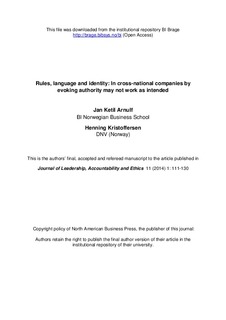| dc.contributor.author | Arnulf, Jan Ketil | |
| dc.contributor.author | Kristoffersen, Henning | |
| dc.date.accessioned | 2014-06-25T08:46:25Z | |
| dc.date.available | 2014-06-25T08:46:25Z | |
| dc.date.issued | 2014 | |
| dc.identifier.citation | Journal of Leadership, Accountability and Ethics 11 (2014) 1: 111-130 | nb_NO |
| dc.identifier.issn | 1913-8059 | |
| dc.identifier.uri | http://hdl.handle.net/11250/196774 | |
| dc.description | This is the authors' final and accepted version of the article, post refereeing. Publisher's version is available at http://www.na-businesspress.com/ | nb_NO |
| dc.description.abstract | We argue that the concepts "rules" and "relationships" are heavily affected by mindsets related to
language and culture. Western societies base laws and enforcement on the assumption on transparent,
universal rules, whereas East Asian societies rely more on relationship-based governance. Interviews
with 58 employees from a global construction company spanning Scandinavia, Germany, and China show
how evoking authority under uncertainty may exacerbate rather than solve failing co-operation.
Knowledge transfer and innovation are crucial to business operations and cross-cultural management
must find workable solutions. "Cultural ambassadors" are working on both sides to co-ordinate
communication and establish relationships. | nb_NO |
| dc.language.iso | eng | nb_NO |
| dc.publisher | North American Business Press | nb_NO |
| dc.title | Rules, language and identity: In cross-national companies by evoking authority may not work as intended | nb_NO |
| dc.type | Journal article | nb_NO |
| dc.type | Peer reviewed | nb_NO |
| dc.source.journal | Journal of Leadership, Accountability and Ethics | nb_NO |
| dc.description.localcode | 1, Forfatterversjon | nb_NO |
